MercoPress. South Atlantic News Agency
Tag: Pedro Sanchez PSOE
-
Thursday, April 28th 2016 - 07:11 UTC
Spain remains ungovernable: elections for new government on June 26
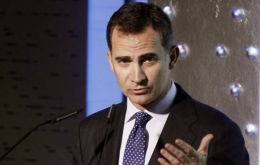
Spain will hold a repeat of national elections in June following the failure of a last-ditch effort by King Felipe VI to prod bickering Spanish politicians to form a new government. The King chose not to ask any candidates he interviewed this week to try to form a government and break a stalemate that has left Spain with a caretaker government in the wake of inconclusive elections in December.
-
Thursday, January 14th 2016 - 06:33 UTC
Socialist becomes Spain's parliament speaker; no agreement yet on new government
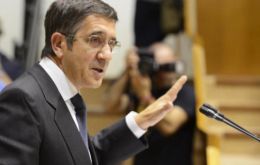
Spain's parliament held its first session Wednesday, with lawmakers from four main parties taking their seats at a time of political turmoil. Lawmakers picked a Socialist, Patxi Lopez, a former head of the regional government of the northern Basque Country, as parliamentary speaker, in the first pact between rival parties still engaged in talks to form a government since last month's inconclusive election.
-
Thursday, December 31st 2015 - 08:35 UTC
Spain's Socialists rules out any partner that supports Catalonia independence referendum
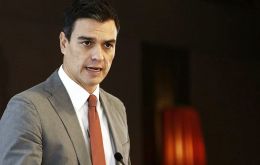
Spain's Socialist party ruled out forming a new government with any party that supported a referendum on independence in Catalonia, a stand that prolongs political uncertainty after this month's inconclusive national election.
-
Thursday, December 24th 2015 - 07:55 UTC
Socialists reject Rajoy's offer to join a PP government, but all parties want to avoid new elections in two months

Spanish Prime Minister Mariano Rajoy suffered a first major setback in his bid to stay in office as the Socialists refused Wednesday to back his attempt to form a new government following an inconclusive general election. Rajoy's conservative Popular Party won the most ballots in Sunday's vote but lost its absolute majority in the 350-seat lower house of parliament, taking just 123.
-
Monday, December 21st 2015 - 07:14 UTC
Spain's left-right draw ends two-party system and marks time of coalitions
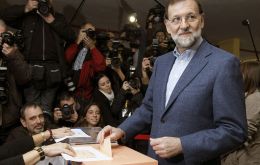
Spain is heading for a period of difficult coalition-building after Sunday’s elections in which Prime Minister Mariano Rajoy's conservatives came first, but were far short of a majority and with no obvious coalition partner after the centrist Ciudadanos (Citizens) did worse than expected, finishing fourth.
-
Saturday, December 19th 2015 - 02:43 UTC
Rajoy rejects the idea of a grand coalition, German style, after Sunday's vote
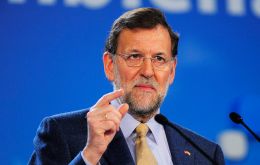
Spanish Prime Minister Mariano Rajoy on Friday rejected any idea of his ruling Popular Party (PP) trying to form a grand coalition with the main opposition Socialist Party (PSOE) after Sunday's general election, in a bid to stop emerging political forces Podemos and Ciudadanos from entering government.
-
Tuesday, December 15th 2015 - 06:56 UTC
Spain's electoral debate dominated by corruption accusations
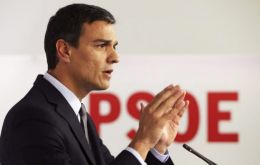
Spanish Prime Minister Mariano Rajoy was accused of being unfit to govern by his socialist challenger Pedro Sanchez on Monday night in an unusually ferocious election debate held before this week's general election. Sanchez performance makes him a first line contender for highest office in Spain, even if Rajoy's party as forecasted wins the election
-
Tuesday, December 15th 2015 - 06:41 UTC
Spain's Rajoy expected to win next Sunday's election but without a majority
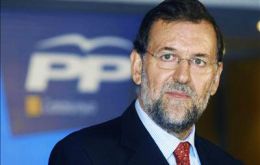
The latest surveys on the Spanish legislative elections to be held next Sunday, predict a victory for the ruling center-right People's Party, or PP, but without an absolute majority, so the party will have to form a coalition to establish a government.
-
Tuesday, November 10th 2015 - 05:56 UTC
Rajoy says “Catalonia is not going anywhere, nothing is going to break”

Spanish Prime Minister Mariano Rajoy announced on Monday his government would file an appeal with the Constitutional Court to ensure that an independence declaration backed by the Catalan regional parliament has “no consequences”, he told a news conference.
